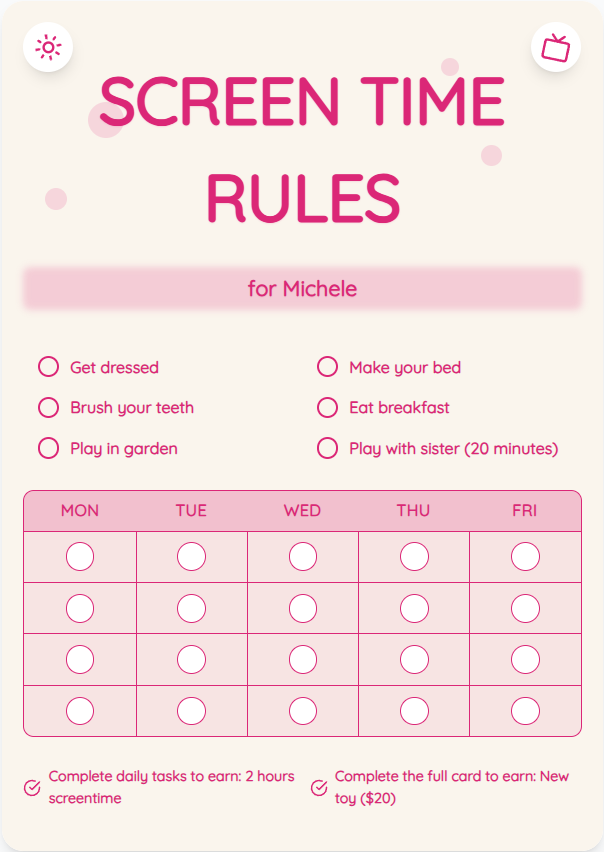What Screen Time Does to Your Brain: A Parent's Guide to Managing Technology Use
As a parent, you may wonder about the effects of screen time on your child's developing brain. In this guide, we delve into the impact of excessive screen time and provide actionable tips to help you create a healthy balance in your child's tech usage.
See What Your Screen Time Chart Will Look Like
Here's an example of a beautiful, customizable screen time rules chart you can create for your family

The Brain Development Connection
Research suggests that excessive screen time can negatively affect children's brain development. Constant exposure to screens can impact cognitive functions, attention span, and social skills. To mitigate these effects, it's crucial for parents to monitor and limit their child's screen time.
Practical Tips for Managing Screen Time
1. Create a screen time chart using tools like ScreenTimeRules.com to set clear limits. 2. Encourage outdoor activities and physical play to reduce screen dependency. 3. Establish tech-free zones in the house, such as bedrooms and dining areas. 4. Engage in screen time activities together to monitor content and promote bonding.
Put These Tips Into Action
Create a custom chart to implement these strategies with your child
Setting Boundaries and Consistency
Consistency is key when it comes to managing screen time. Establishing clear rules and consequences around technology use can help children understand boundaries. By maintaining a balance between screen time and other activities, parents can support healthy brain development in their children.
Practical Tips for Success
- Create a screen time schedule that includes breaks for physical activity.
- Use parental controls to monitor and restrict access to inappropriate content.
- Lead by example and demonstrate healthy screen habits to your child.
Frequently Asked Questions
How much screen time is recommended for children?
The American Academy of Pediatrics recommends no more than 1 hour of high-quality screen time per day for children aged 2-5 years. For older children, consistent limits should be set based on age, ensuring a balance with other activities.
Can educational apps and games have a positive impact on children's brains?
While some educational content can be beneficial, moderation is key. Ensure that screen time includes a mix of educational and interactive activities, and prioritize hands-on learning experiences for holistic development.
By understanding the effects of screen time on your child's brain and implementing practical strategies, you can create a healthy tech environment that supports their overall well-being. Visit ScreenTimeRules.com to access customizable screen time charts and start promoting a balanced approach to technology use in your family.
Ready to Transform Your Family's Screen Time?
Join thousands of parents who have successfully managed screen time with our customizable charts.
